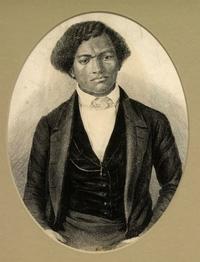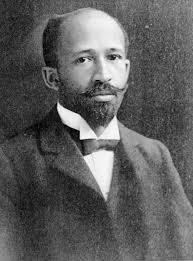Wisdom, Bravery, Trueness: Frederick Douglass and W.E.B. Du Bois
By Kalela W.It may not have seemed remarkable. In 1895, at a college in Ohio, during a memorial service, students and faculty paid tribute to a man they held in high esteem. They recited the Lord’s Prayer, they heard hymns—perhaps spirituals that the man being honored would have remembered, were he still living among them. University dignitaries made remarks—these have been lost to history. But what was left for us were the words spoken by a young professor, twenty-seven years old, arrived of late from Berlin after studying abroad. To truly remember this man, the young professor said, “We must first know what he did, and then seek in our own lives to picture forth again his wisdom, his bravery, and his trueness.”
W.E.B. Du Bois, then a professor at Wilberforce University, saw Frederick Douglass only once, when Douglass delivered a lecture at the 1893 Chicago World’s Fair. They may not have even met, may have never shaken hands. Yet Douglass’ life and work informed Du Bois’, who in 1895 pledged in his diary that his life would be devoted to “the rise of the Negro people.”
Born in February of 1818—Douglass never knew the day—he committed his life to the same. From the time he escaped from slavery, risking his life to run north and quickly ingraining himself into the abolitionist community, he worked tirelessly towards equality.
On February 23, 1868, William Edward Burghardt DuBois was born in Great Barrington, Massachusetts. His mother was a domestic worker, his father a barber who left when Du Bois was young. The congregation of his childhood church raised the money to help send Du Bois to Fisk University, a historically black institution in Tennessee. There, he saw Jim Crow laws first-hand. Even in New England, he’d been well-steeped in experiencing racism, but this was another grade. It changed him profoundly.
In some ways, Du Bois picked up the work that Douglass had to leave undone. Du Bois borrowed Douglass’ phrase—“the Color Line”—as a guiding idea in his collection of essays, The Souls of Black Folk. Both men made good on their pledges to strive for equality; along the way, both clashed with other leaders of the abolitionist and Civil Rights movement. Both believed in women’s rights, although they often disagreed with the Women’s Rights movement. And both men fought for equality till their last. Douglass’ final lecture in 1894, “Lessons of the Hour,” was a lash of fury against lynching in the South. Du Bois, in an act of protest, renounced his U.S. citizenship in 1961, moving to Ghana, where he died two years later.
February 2018 marks 200 years since Douglass’ birth, and the 150 years since W.E.B. Du Bois’. Fifty years away from the tumult of 1968, the year of Martin Luther King Jr.’s assassination and the passage of the Civil Rights Act, the road towards equality in 2018 is still unpaved. Reflecting on the lives of activists Frederick Douglass and W.E.B. Du Bois, we can discover the wisdom, bravery, and trueness within ourselves so that we may finish the work they asked of us.
The Free Library of Philadelphia is marking the sesquicentennial and centennial of Frederick Douglass’ and W.E.B. Du Bois’ work with programming throughout 2018. Join us on February 26 at Parkway Central for Douglass and Du Bois in the New Millennium, a discussion of these men’s literary works, and stay tuned for a special exhibition this fall.
Have a question for Free Library staff? Please submit it to our Ask a Librarian page and receive a response within two business days.


